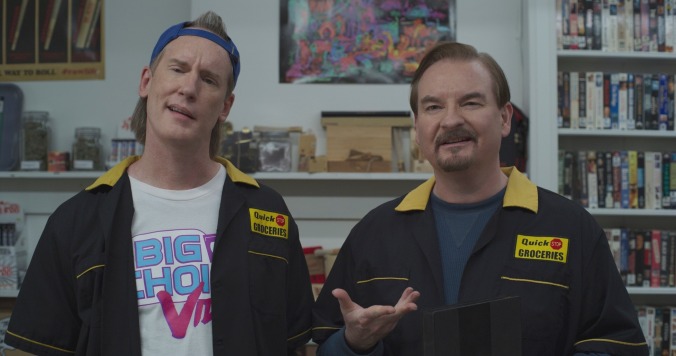Kevin Smith's Clerks III cashes in on nostalgia—at a dispiriting cost
Smith returns to his Askewniverse with an all-too-familiar story about growing older that does a disservice to its characters and, in turn, the audience

There’s a watchable 90-minute movie hidden in the almost two-hour runtime of Clerks III. It’s too bad writer-director Kevin Smith doesn’t possess the clarity of vision he once had to refine ideas well enough to let his narrative do the talking. Instead, he explains over the end credits what this film should’ve been: a tribute to those who inspired what has become a trilogy. Had he made this third chapter in the Quick-Stop Groceries “saga” a self-reflexive exploration of his beloved, acerbic clerks negotiating an angst-riddled world that’s risen up to not only meet but reward their snarky standards, we’d all be the better for it. Instead, he delivers a sad-sack iteration that fails to deliver emotionally earned closure to characters who should triumph over their tribulations.
Sixteen years after Dante Hicks (Brian O’Halloran) and his sardonic bestie Randal Graves (Jeff Anderson) bought and restored their former workplace, the duo remains behind the counter serving up unwanted sass to their quirky clientele. Local burnouts Jay (Jason Mewes) and Silent Bob (Smith) continue to be a lingering presence, hanging outside the mini-mart. On the surface, life has seemingly stayed the same, yet they’ve all experienced significant gains and losses. Randal turned his bankrupt video rental store into a successful weed dispensary, but Dante’s been dealt an unlucky hand, failing to heal his anguish over the sudden, accidental deaths of his wife Becky (Rosario Dawson) and young daughter. His friendship with Randal has persevered, but it’s about to be put through its greatest test.
Randal, after intensely bickering with Bible-thumping, NFT-dealing employee Elias (Trevor Fehrman), collapses on the floor of the store. He’s in the throes of a heart attack, sending Elias into a flurry of worried prayer and leaving Dante vulnerable due to his previous trauma of losing loved ones. The emergency, live-saving stent put into Randal’s heart gives him an epiphany: instead of being an observer of movies, he’s going to make one about his life. Hijinks and some hilarity ensue as he writes, casts and films what becomes the movie we know as Clerks.
Series continuity is observed only when convenient for Smith. The refurbished store’s financial woes don’t quite line up with the ending of Clerks II (where perpetual slackers Jay and Silent Bob saved the day), a choice orchestrated primarily to bring back his constant collaborator and real-life wife Jennifer Schwalbach Smith, playing Dante’s bitchy ex-fiancé, Emma. While he recycles Dante’s perpetual struggle of feeling stagnant and frustrated, he betrays the character’s essence, surprisingly not allowing his aggrieved creation to grow as he has continually done so in the past. It’s depressing.
Worse, Smith regurgitates similar third-act beats from the film’s 2006 predecessor, which not only feels redundant, but highlights a desperate need for overarching commentary in the meta-context of the franchise. Randal’s tasked to relearn the same exact lesson about his friendship with Dante as before, this time with less finesse. It’s a watered-down redux of their friction in both Clerks and Clerks II, whose narrative poignancy gets undercut by unfunny jokes and gags. Meanwhile, “fridging” the franchise’s lead female to give a male character an arc feels like an especially wrong-headed and insincere move.
While the filmmaker stocks the picture with callbacks and references in his patented style (don’t worry, there’s even more dialogue about obscure Star Wars characters), actually funny jokes are few and far between. A revolving door of cameos from Sarah Michelle Gellar, Melissa Benoist, and Ben Affleck, amongst others, perks up the proceedings, offering a respite from a second act plateau of energy. He also relies heavily on soundtrack cues, including My Chemical Romance’s “Welcome To The Black Parade,” Jefferson Starship’s “Find Your Way Back,” and John Gorka’s “I’m From New Jersey,” to augment his phony emotional catharses.
Smith’s insights into aging and nostalgia mask a noticeable, dispiriting inability to engage with their finer points, something he’s done previously. It’s admirable that he keeps these guys relegated to their Jersey bubble, but we’re living in an era full of Dantes and Randals, and by now they feel cliché, not comforting. Though Smith and his collaborators seem eager to reunite us thoughtfully with these surly Gen-Xers during their respective midlife crises, their efforts could use a lot more polish. Ultimately, the absence of any meaningful sentiment about grief or personal growth (or anything else) makes the story’s maddening, rote familiarity feel especially lazy—which is why Clerks III lives up to the legacy of its uninspired characters in all of the wrong ways.